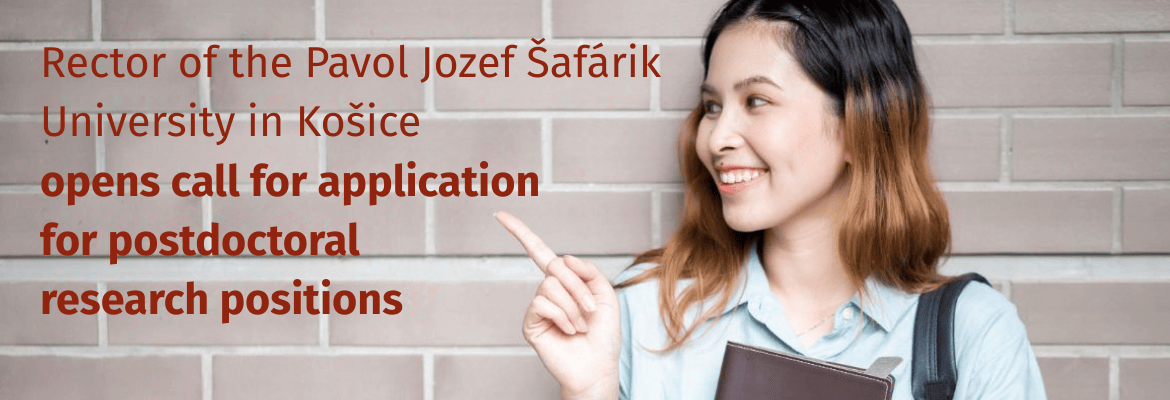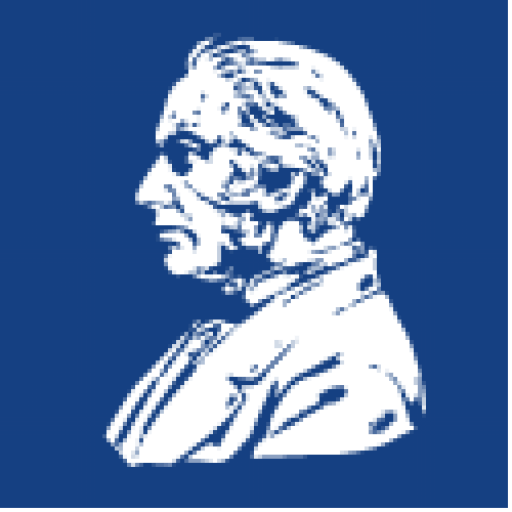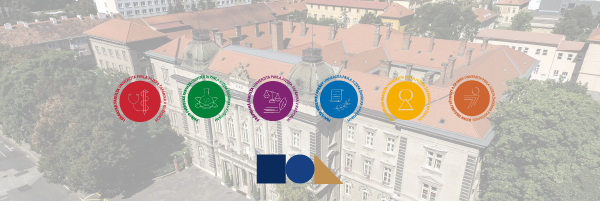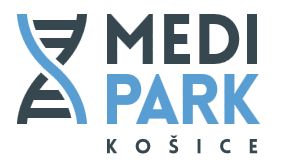
At Pavol Jozef Šafárik University in Košice, we recognise that postdocs are the main powerhouse of research output and are destined to become the future leaders of science. The University postdoc programme was established specifically to provide our postdocs with the necessary scientific & technical support and tailored mentoring to fast-track their careers.
Research groups at University cover a range of expertise and advanced techniques in Medicine, Life Science, Chemistry, Physics, Mathematics, Computers Science, Law, Arts and Public Administration.
Why complete a post-doctoral stay at Pavol Jozef Šafárik University?
Your postdoctoral stay at the University of Pavol Jozef Šafárik in Košice will be as you plan it. You can join a research team, do independent research in the laboratory. In any case, you will solve topics that you choose yourself – under the auspices of a tutor – the responsible worker for the postdoctoral stay at your new place of work.
You will be involved in research projects
You will be able to choose from more than 300 projects that are currently being solved at the University of Pavel Jozef Šafárik in Košice. You will, for example, participate in research on the structure and dynamics of biomolecules using x-ray techniques, to research the history of the Holocaust, you will analyse the position of women in the political environment of the Slovak Republic and in the Nordic countries of Europe, or you will start your own research that you propose yourself.
You will continue to grow professionally at Pavol Jozef Šafárik University
You can continue to learn and improve your skills and abilities necessary for research, development and teaching.
You will work in top laboratories with top experts
We will provide you with the necessary premises, laboratories with top equipment and instruments for your research. You will work, for example, in these laboratories, in the university science parks UVP Medipark, UVP Technicom and the scientific research centre Promatech together with by our experts from various fields of research or in a collective of workers from some of our top teams.
Your work can have a real use
Great research does not have to stop with a Ph.D. title next to your name. You will get contacts with scientists from your field and new ideas and inspiration for your work at international conferences in which you will have the opportunity to participate. Your work can also have a real use. It may also help shed light on various current issues and long-standing problems. For example, you will be able to design and test new approaches in the field in vitro fertilization, set a new direction in leukemia treatment, design a new generation of targeted transport systems capable of binding a wide range of drugs or new forms of work with socially disadvantaged groups, design and test the use of the magnetoimpedance phenomenon for sensing external parameters in multifunctional materials, participate in the data analysis of legislation and jurisprudence in business law and information technology law, propose the exercise of competences and the creation of public policy of municipalities and cities in an international context or participate in the solution of various other topics and theoretical or practical problems.
- PhD or its equivalent reached within the last 5 years (the period is calculated from September 30, 2025 and it does not include maternity and parental leave, civilian military service, military service and other objective obstacles to the professional practice);
- Minimum requirements set out in the call and topic must be met.
The application deadline: June 30, 2025
Selection procedure: The candidates will be selected by a committee appointed by the Rector of the Pavol Jozef Šafárik University in Košice, based on the assessment of the materials submitted by the candidates.
Expected fellowship start: October 2025
Contact: Zuzana Szattlerová, zuzana.szattlerova@upjs.sk, +421 55 234 1129
Applicants should submitthe following documents in electronic form along with the applicaton:
- curriculum vitae,
- certified copies of second- and third-level university diplomas,
- overview of publication outputs registered in professional databases WoS, SCOPUS and ERIH+, including responses to published works; in the case of outputs that are not registered in the professional databases WoS, SCOPUS and ERIH+, copies thereof or copies of pages showing the authorship of the applicant are submitted when submitting the application and relevant bibliographic information is provided (title sheet of the publication, imprint, content, documentation on the review process, if reviewers are not mentioned in the publication), overview of patents, utility models, and other forms of intellectual property,
- overview of participation in implementing research projects and completed study stays abroad,
- overview of the most significant achievements and awards so far,
- two letters of recommendation from two professors, where only one of the professors may be from the applicant’s training site,
- a letter of acceptance from the host professor (the person who has the relevant competences and bears the main responsibility for the implementation, development and quality assurance of the programme of the third level of higher education) from the host workplace, issued on the basis of an interview with the candidate; only one letter of acceptance may be issued per research topic; in the letter of acceptance, the host professor must guarantee material and financial requirements for the implementation of the postdoctoral project,
- research project proposal during the proposed work at the given workplace (maximum 5 pages),
- confirmation of previous experience (if relevant),
- extract from the criminal record; this is submitted only by selected candidates.
Below you can find a list of group leaders offering a postdoc position in the current call and descriptions of the offered postdoc research projects.
April 23, 2025 – June 30, 2025: Application period for postdoctoral positions.
All applicants will be informed about the result of the selection process until August 15, 2025. We can not answer status requests before.
October 2025: Successful applicants will start their postdoctoral stay during October 2025
- A 2-year contract with a possibility of extending up to 12 months;
- € 1200 – 2000 (brutto) monthly salary;
- Medical health insurance coverage is provided for the duration of the fellowship;
- All research costs will be supported by the research group´s budget;
- Support for participation in Meetings and Courses is generally provided by the Group Leader.
- Living in Košice
- Cost of living in Košice
1. quality of objectives
2. quality of the project
3. applicant qualities
4. other qualities and competencies of the applicant
Every 12 months after the employment commencement, a postdoctoral researcher submits a Report on the Results Achieved During Postdoctoral Stay to the Rector of UPJŠ, including a list of published works or works sent to be printed. The report is signed by the host professor and the responsible postdoctoral officer at the workplace.
Upon completion of the postdoctoral project, the postdoctoral researcher is required to submit a Report on the Results Achieved During Postdoctoral Stay as well as a Financial Report.













